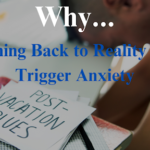Living with Anxiety: Simple Daily Habits to Reclaim Your Peace
Living with Anxiety can be identified as a massive cloud hanging over your head, casting an outline on your concepts, feelings, and even physical health. However, controlling anxiety doesn’t always need extreme life changes. Instead, small, planned daily routines can help you reclaim command and bring lifelong peace to your mind. This article investigates eight simple but influential routines that can help diminish stress and anxiety, enabling you to live with more stability and calm.
Information about Autism:
Autism, also known as Autism Spectrum Disorder (ASD), is a developmental disorder that influences how a person recognizes, talks with others, and interacts with others. It surrounds a broad range of symptoms and actions, called a “spectrum.” People with autism may encounter trouble in social interactions and talking with others and may engage in tedious habits. However, the seriousness and nature of these challenges can vary remarkably from one individual to another.
8 Daily Habits to Reclaim Peace and Reduce Stress

1. Start Your Day with a Watchful Morning Routine
The way you initiate your day lay out the stage for the rest of the day. Embracing mindfulness practices into your morning habits—whether it’s through extended breathing, meditation, stretching, or quiet thinking—can make you feel at peace before the day’s demands take over.
Why it works:
Mindful mornings provide peace to your nervous system and make ready you to control stress more successfully, diminishing anxiety all over the day.
2. Move Your Body Regularly
Exercise doesn’t just empower your body—it’s a major element for supporting mental health too. Physical activity enlarges endorphins, which makes your brain feel good and drops cortisol levels, assisting you in feeling more relaxed and in control.
Why it works:
Whether it’s yoga, a quick walk, or dancing in your living room, motion helps burn off negative energy and improve your mood.
3. Limit Social Media and Screen Time
The continual flow of details and comparisons on social media can enhance anxiety. Give your brain a break by placing boundaries around screen time. Try to select phone-free times, mainly in the morning and before bed, to shield your peace.
Why it works:
Diminishing screen time declines exposure to anxiety-producing content and makes better your power to focus on real-life situations and experiences.
4. Practice Gratitude Every Day
Thankfulness would be a simple yet influential way to shift your mindset. Each day, write down three things you’re pleased with, no matter how small. This action can help redirect your concepts from worry and stress to valuing and positivity.
Why it works:
Focusing on what you’re thankful for helps to achieve a more positive outlook on life, diminishing the impact of anxiety.
5. Nourish Your Body with Balanced Meals
What you eat could have an extreme outcome on your mental condition. Eating a stabilized diet rich in nutrients and low in processed sugars helps support strong energy levels and holds up cognitive function. Make sure to drink a lot of water all around the day, too.
Why it works:
Good nutrition helps control blood sugar levels, which can change your mood and lessens anxiety-driven physical signs like shakiness, pain or irritability.
6. Design Boundaries and Learn to Say No
Learning to say “no” is important. Being overwhelmed can lead to burnout and expand stress. Set clear margins with others—whether it’s at work or in your individual life—and give importance to your limits without guilt.
Why it works:
By keeping your time and energy safe, you diminish overload and give yourself the mental space to rest and recharge, keeping anxiety at the corner.
7. Spend Time Outdoors in Nature
There’s something uniquely healing about being outdoors surrounded by the living world. A walk in the park or simply standing by a window with a sight of the sky and trees, can notably make a difference. Nature has a healing power on the mind and the body, helping diminish stress and anxiety.
Why it works:
Nature watching has been shown to lower cortisol levels and encourage a feeling of peace, providing a natural and successful treatment for anxiety.
8. Prioritize Quality Sleep
The absence of sleep can intensify anxiety, while standard sleep brings back your mind and body. Generate a bedtime routine that assists you settling down, whether through reading, meditation, or hearing soothing music. Keep away from screens and heavy meals before bed to make sure a restful night. Living with Anxiety will be managed.
Why it works:
Sleep is crucial for emotional adjustment. When you’re well relaxed, your brain is better equipped to control stress and anxiety, making it easier to stay calm during the day.
Final Thoughts: Small Habits, Big Change
Living with anxiety doesn’t mean you’re worthless or that you won’t be able to have a fulfilling life. These eight simple practices can help you diminish daily stress and bring more calm into your life. By including them in your schedule, you’ll slowly build a strong base for finer mental health. Remember, progress is made one small step at a time—so start with just one or two actions and watch how they construct a positive difference.
FAQs About Living with Anxiety and Daily Habits
Q: How long will it take to see the benefits of these habits?
A: It varies for everyone, but many people begin to observe positive changes within a few weeks of continually adopting these habits. The key is firmness of purpose and patience.
Q: Can these habits completely cure my anxiety?
A: While these habits can remarkably diminish anxiety signs, they may not “treat” anxiety thoroughly. For persistent anxiety, it’s important to seek advice from a mental health professional.
Q: How can I stick to these habits long-term?
A: Start small and give attention to one action at a time. Make them a part of your daily work by fixing them to existing actions.
Q: What should I do if these habits don’t help my anxiety?
A: If your anxiety continues or intensifies, it’s important to seek support from a healthcare provider.



